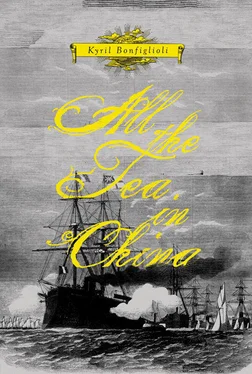In those long, sunny days, each one so like the other that one could not tell if one were in yesterday again or no, even an attack of flatulence brought on by the Doctor’s “shot-skilligolee” (dried-pease soup) was a memorable event. (For my part, I have no quarrel with flatulence: it is a harmless enough recreation, provides an admirable commentary to novels such as Northanger Abbey , gives no offence to oneself and little to bystanders — although Peter called me Montgolfier — and has been much praised by the American B. Franklin, who also invented tram-conductors.)
But the first great relief from the bewildering monotony monotony of sea and sun and steady wind was when we put in for water at Delagoa Bay. It seemed that sweet water was plentiful there and cheap: later in our voyage we might well be paying £1 a ton for the stuff! Even in those days I preferred richer fluids but the men needed to drink great quantities of it. It is good, too, for shaving and washing.
Delagoa Bay is not an interesting port-of-call. I found little to see, nothing good to eat and drab girls who were yellow of complexion, also ugly and tired, tired. An enterprising youth sold me his sister for the night, vowing that she was but fourteen and a virgin. I cannot be sure that he lied about her age but her virginity was less than plausible: she accepted my courteous attentions with all the sweet, coy diffidence of a sow who has too often been taken in a wheelbarrow to the boar. I did not spend the whole night with her, although I had paid for it; she made me feel “like a piece of string in a bucket of warm water” (as the rough sailormen say) and I was anxious to get back to my bar of mercury soap.
As I made my way to my cabin I encountered Blanche: she was lightly clad and seemed to be coming from the direction of the First Mate’s quarters. She smiled enigmatically at me and was gone before I could select a suitable expression for my own face. I fancy I looked shifty, simply.
“Peter,” I asked gloomily as I rolled into my bunk, “is there also such a thing as a sea-cow?”
“Indeed there is; it is also known as the dugong and many legends of mermaids are based upon …”
“Thankyou,” I said. “I only wished for a plain ‘yes’ or ‘no’. Goodnight.”
“Goodnight, Karli.” He spoke no more that night. As I fell into a fretful doze I scratched the beginnings of my first gurrey-sore. To be Able-Bodied one should have one’s hands and forearms pocked and pitted with these sores. You will never know what they are, and you do not care to know.
I know what you care about.

Watered, provisioned with fresh fruit and disenchanted with the dreams of sweet femininity which some of us had been foolishly harbouring, we set sail again for the Cape of Good Hope where, everyone assured me, things would be better. They were mistaken. Cape Town — called the Tavern of the Seas — is full of dishonest people; many of them claim to be Dutch but their language is quite barbarous to a true Hollander, their religion is preposterous and their women are devout and fat — excepting the whores, who are smelly and fat. Many of these Boers, Afrikaaners as they call themselves, are Jews: the women of these, of course, are chaste and fat.
In this Town the best bargain for a lusty young man is a Griqua girl, you may depend upon it. They are astonishing, quite astonishing; it puzzles me where they can have learned such sophisticated arts of love in a community so devoted to Jehovah and fat old ladies.
Soon the rich and rare cargo of ostrich plumes and rhinoceros horns was flowing aboard and my days were much taken up with writing these things into manifests, consulting Bills of Lading and applying the blessed mercury soap whenever my duties permitted me a little leisure. To this day I never travel without a cake of such soap; it is as sovereign as Dr Collis Browne’s noted Chlorodyne, which is saving so many cholera-stricken soldiers in the Transvaal today.
There came a time when the last bale of cargo had been stowed away, the last official bribed and, for me, the last acceptable Griqua girl had revealed her most exhausting tour de force. We weighed anchor; none too soon for the crew’s health, I may say: British sailors are like animals when they see a foreign woman, animals.
Clearing Cape Town when bound for the East is, or was in those days, something of a dangerous proceeding, not as dramatic as rounding Cape Horn but still dangerous. Davy Jones’s locker there is well-stocked with the bones of fine ships and brave men. First one must fight round a thirty-mile projection of the Cape, usually against stubbornly adverse winds, then run east past Cape Agulhas, notorious for its fiendish winds, then parallel to the country’s southern shore where there is a small patch of low-lying ground between Green Point and Mouillé Point over which the fog has an evilly misleading way of clinging. A mere passenger might have thought this part of our passage merely slow and tedious but I knew Peter well by now and could see that under his ordinary air of carelessness there was now a tense preoccupation and fatigue. I noticed, too, that both he and the Second did not, at this time, take advantage of all the sleeping-times to which they were entitled — and sleep, even more than rum and dry clothes, is the sailor’s most coveted treat.
Peter Stevenage was a strange and valuable man and I often blame myself for not having prized him more at that time, when my character was being formed. He had the rarest and truest sort of charm: that is, he did not exude a charm of his own but gave you the certainty, simply with a special sort of silence, that you were charming him. This is not an art which can be learned by taking thought or by studying books; it is not an art at all, it is a gift from God, if you will pardon the expression. (There was a boy at my school who had this gift. He was neither tall nor strong nor handsome; at lessons he was always just half-way up, or down, the form. At games he was reliable but did not shine. He spoke little and never harmfully, even of us few Jews in the school, but he would listen intently to anyone who spoke to him, even the masters; this was his gift. When you had finished he would say “yes” or perhaps “no” and you would go away purged and happy, like a Papist from the confessional-box. All of us in my year would cheerfully have died for him, except that he would have thought this a bizarre thing to do. He is now, without a doubt, the teller in a bank, trusted by one and all, and goes home each evening to a fat wife in a house smelling of cabbage and children’s urine.)
Peter had been born with this happy gift of listening as though each word you spoke was powerful; his only other gift was that of a gentle, solemn mockery which prevented one from admiring him too much. This was, I am sure, deliberate. Only the strongest of men try, when they are ripe for death, to make themselves appear valueless. Peter was strong in just such a way.
The air in the Indian Ocean, when we were fairly into it, was hot and moist and cosy as the well-pissed bed of a sleepy child. There were little, desultory airs which sometimes made our sails rattle and shake but these scarcely did more than keep the quartermaster awake at his wheel.
There came a day when our diminutive Captain was pacing up and down, glaring aloft from under his chimney-pot hat in a fashion which made the more knowing of our crew suspect that a capful of wind might be signified by the barometer and that he would presently be ordering royal studding-sails, sky-sails and all the other “flying kites” that she had room for to be sent aloft, although there was small chance that any of our rivals in the trade would have found better winds.
Читать дальше













